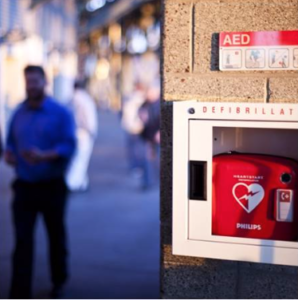Featured: MD Solutions International (MDSI)
Are Your Workplace AEDs Maintained and Ready to Respond to a Sudden Cardiac Arrest?

The current COVID-19 pandemic has changed many work environments and much of our corporate workforce has faced the reality of working remotely. With the extended absence of employees tasked with routine device upkeep, workplace AED programs have been very strained.
AED programs are only successful if there are individuals on site to perform inspection and maintenance activities on a regular basis. The COVID-19 pandemic has led to workplace AEDs not getting the regular service or inspections that they typically would. This becomes especially significant as employees returning to work are discovering expired defibrillation pads and low to dead AED batteries.
As work environments that have AEDs as part of their sudden cardiac arrest response plan continue to re-open, it is critical these devices are made an inspection priority, so they are ready to respond immediately.
All AED programs must have certain key elements to be successful when it is time for rescuers to deploy. It is a national best practice for these programs to include weekly or monthly visual inspections. At a minimum, every AED should be visually or remotely checked monthly. These consistent inspections ensure that the AED has power and has passed self-checks indicating proper function.
- Upon inspection, AEDs might be audibly beeping to indicate a low battery, self-check failure or a completely dead battery.
- All defibrillation pads have a limited life expectancy and will have an expiration date indicating when they should be replaced.
- Expired defibrillation pads may not allow the AED to sense the electrical heart rhythm or deliver a needed shock and thus expedient replacement is crucial.
MD Solutions International has been managing and providing support services for AED programs nationally since 1996. This legacy of AED medical oversight has demonstrated over time that corporations and public access AED programs needed more robust support services. We created our Time Zero Readiness® support program to fill this gap with inspection reminders and supplies tracking, essential parts of ensuring a successful response by rescuers to sudden cardiac arrest.
Never before have we experienced the absence of the workforce as we have over these last few months. This absence will most likely continue for the foreseeable future, including institutions such as schools and large corporate office workforces. For those AED program managers that have returned to the workplace, we are seeing a significantly larger than normal volume of AED issues surrounding lack of maintenance.
We are also seeing individuals who had never had the responsibility of an AED program finding themselves in desperate need of education and support to understand the upkeep and maintenance required for device readiness to respond.
Sudden cardiac arrest is still one of the leading causes of death in the United States, even after accounting for deaths attributed to COVID-19, and we continue to review and monitor AED responses by rescuers. CPR and AEDs save lives, but preparation is a must to have an effective response. It is heartbreaking if an AED is not rescue ready when sudden cardiac arrest strikes.
It is essential that those of us supporting AED programs also support the individuals making the initial return to the workplace to perform these critical AED maintenance activities. When you have just minutes, every second counts!
